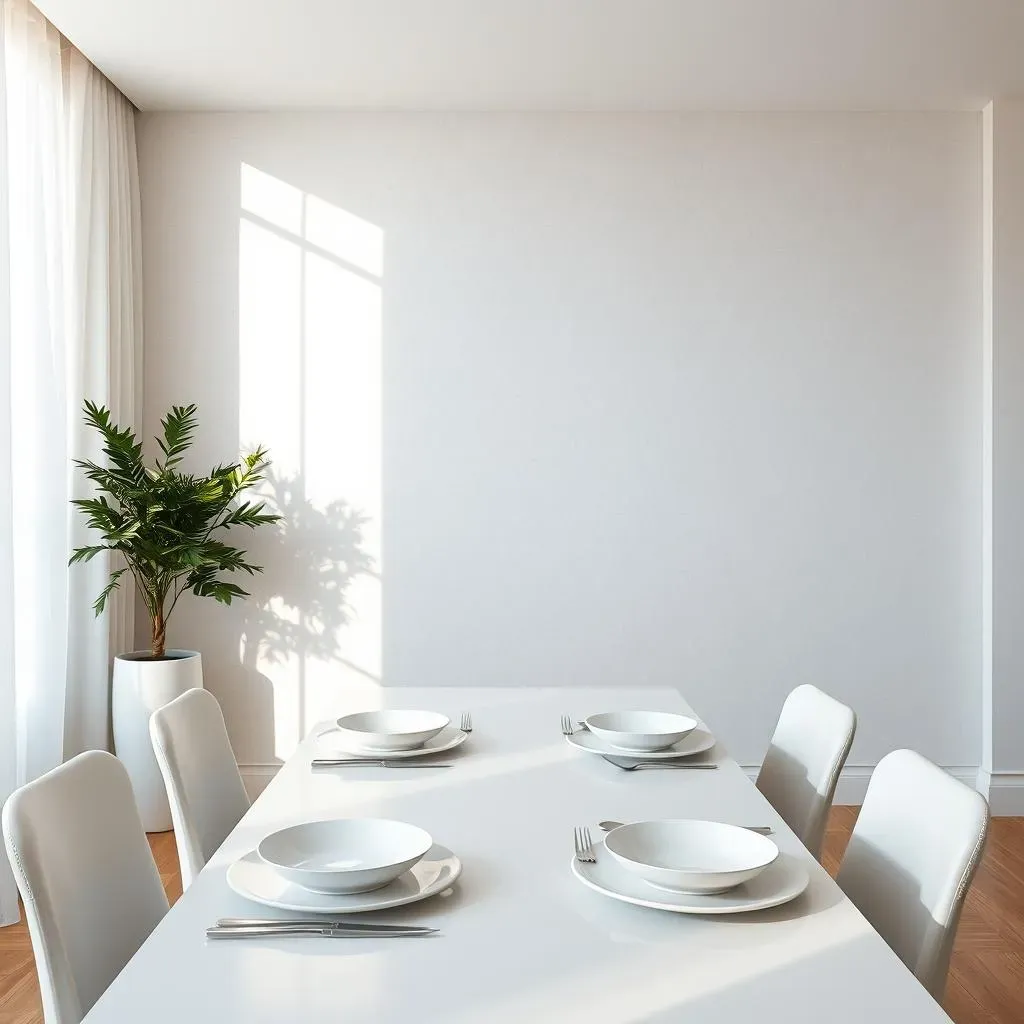Table of Contents
Bored with your blah dining room? Dreaming of a space that wows your guests and reflects your unique style? You're in the right place! Forget expensive renovations; a carefully chosen accent wall can completely transform your dining area from drab to fab. We're diving deep into the world of dining room accent wall ideas, exploring everything from bold colors and captivating patterns to textures that beg to be touched.
Creative Dining Room Accent Wall Ideas to Elevate Your Home
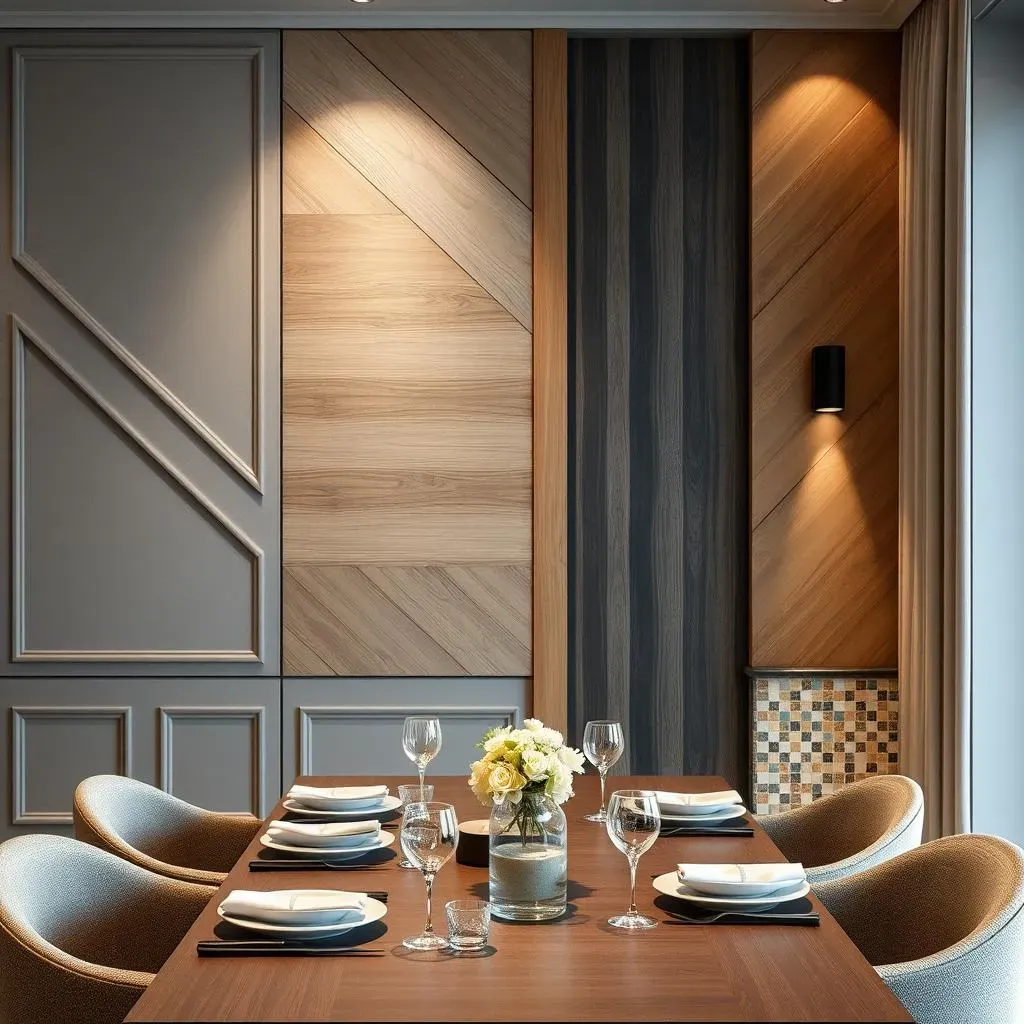
Creative Dining Room Accent Wall Ideas to Elevate Your Home
Alright, let's brainstorm some seriously cool creative dining room accent wall ideas to elevate your home! Forget plain paint; we're talking about walls that tell a story, walls that add texture and depth, walls that are basically works of art. First up, consider millwork. Think classic wainscoting for a touch of elegance, or go bold with geometric patterns for a modern vibe. A gray millwork accent wall can add sophistication without being too loud, while darker shades create a cozy, intimate atmosphere. It's all about setting the right mood for your dining experience.
If you're leaning towards something a bit more rustic, why not try a board and batten wall? This is a super popular DIY project that's both affordable and impactful. You can customize the spacing and width of the boards to create a look that's uniquely yours. Or, for a touch of warmth, explore wood slats. Dark wood slats, arranged horizontally or vertically, add a natural element and can even improve the acoustics of your dining room. Plus, they look amazing under the right lighting!
Now, let's talk wallpaper! Don't think of your grandma's floral patterns (unless that's your thing!). Wallpaper has come a long way, and there are tons of options out there to suit any style. A patterned wallpaper can add instant personality to your dining room. Diamond patterns are classic and timeless, while vibrant, colorful designs can inject a playful energy into the space.
Feeling adventurous? Consider a tile accent wall. This is a great option if you want something durable and easy to clean. You can create a stunning mosaic or simply use a single type of tile in a unique pattern. And don't be afraid to mix materials! A wallpaper and shiplap combo can create a visually interesting contrast, while a black and gold paneled wall exudes luxury and sophistication. The possibilities are endless!
Accent Wall Idea | Style | Material |
|---|---|---|
Gray Millwork | Elegant, Sophisticated | Wood |
Board and Batten | Rustic, DIY | Wood |
Diamond Pattern Wallpaper | Classic, Timeless | Wallpaper |
Tile Mosaic | Modern, Eclectic | Tile |
DIY Dining Room Accent Wall Projects: A StepbyStep Guide
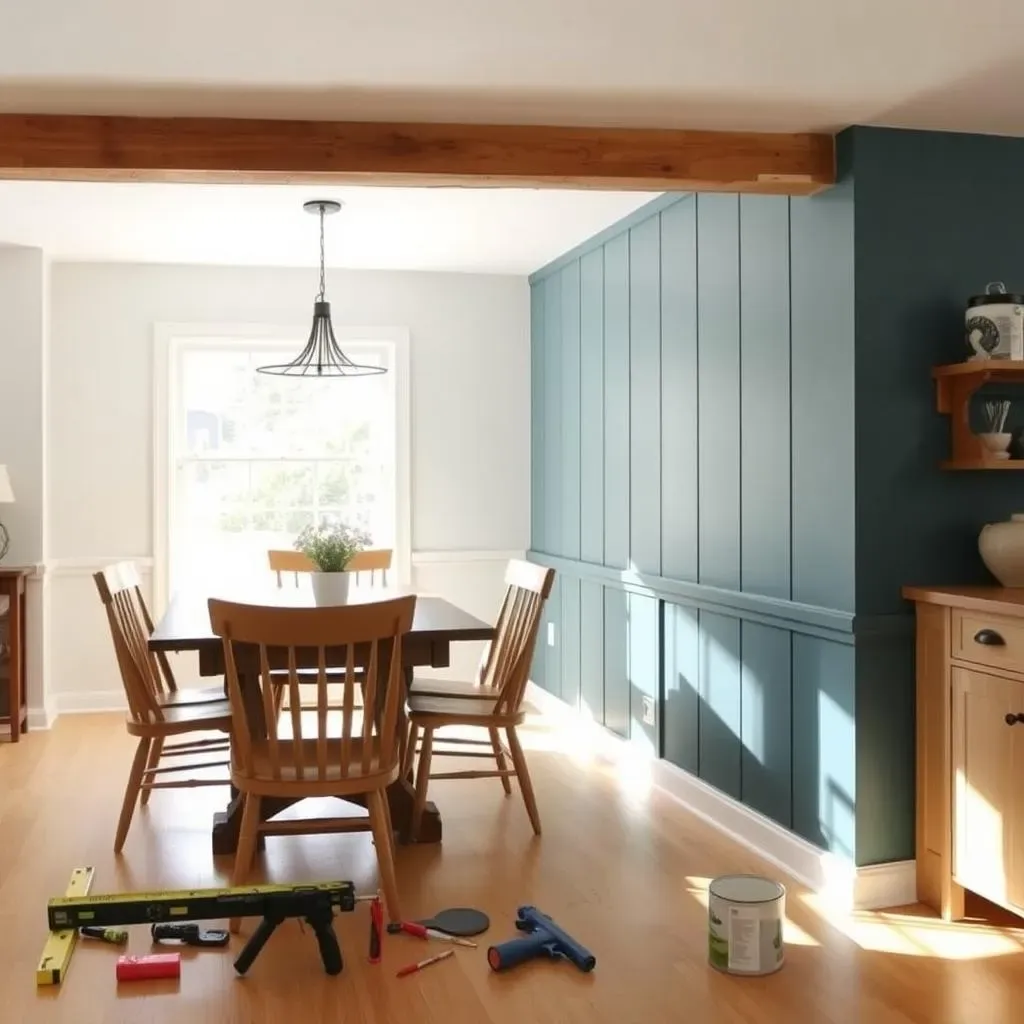
DIY Dining Room Accent Wall Projects: A StepbyStep Guide
Planning Your DIY Accent Wall
so you're ready to roll up your sleeves and create a DIY dining room accent wall? Awesome! First things first: planning is key. Don't just grab a hammer and start swinging! Consider your skill level, your budget, and the overall style you're going for. A complex millwork design might be a bit ambitious for a beginner, while a simple painted geometric pattern could be a weekend project anyone can tackle. Start by measuring your wall and sketching out your design. This will help you determine how much material you'll need and avoid costly mistakes down the road.
Also, think about the tools you'll need. Do you have a level, a stud finder, a saw, and a drill? If not, you might need to invest in some new equipment. But don't worry, you don't need to buy the most expensive tools on the market. A basic set of hand tools will usually do the trick. Safety first! Always wear safety glasses and gloves when working with power tools.
Before you even think about touching that wall, prep is crucial. Clean the wall thoroughly. Spackle any holes, and give it a good sanding. A smooth surface is your friend, especially if you're planning on painting or wallpapering.
- Measure your wall accurately.
- Sketch out your design.
- Gather your tools and materials.
- Prepare the wall surface.
Easy DIY Board and Batten Accent Wall
One of the most popular and relatively easy DIY accent wall projects is the board and batten wall. It's classic, adds texture, and can be customized to fit any style. Start by measuring your wall and determining the spacing between your battens. A good rule of thumb is to space them 12-16 inches apart, but feel free to adjust this based on your personal preference. Next, cut your boards to size. You'll need horizontal boards for the top and bottom, and vertical boards for the battens. Attach the horizontal boards to the wall using construction adhesive and nails. Then, attach the vertical battens, making sure they're evenly spaced and plumb. Finally, caulk all the seams, fill any nail holes, and paint the entire wall your desired color.
Pro tip: use a laser level to ensure your horizontal boards are perfectly straight. It'll make a huge difference in the final result! Also, consider using pre-primed boards to save time and effort. And don't be afraid to get creative with the color! A bold, contrasting color can really make your board and batten wall pop.
Board and batten can lean farmhouse, modern, or even coastal depending on the paint color and the width of the boards.
Step | Description |
|---|---|
1 | Measure and plan the batten spacing. |
2 | Cut the boards to size. |
3 | Attach horizontal boards. |
4 | Attach vertical battens. |
5 | Caulk, fill holes, and paint. |
Creating a Geometric Painted Accent Wall
If you're looking for a more budget-friendly and less labor-intensive option, a geometric painted accent wall is a great choice. All you need is some paint, painter's tape, and a little bit of creativity. Start by painting your wall a base color. Once the paint is dry, use painter's tape to create your desired geometric pattern. Triangles, squares, and hexagons are all popular choices. Make sure the tape is firmly pressed down to prevent paint bleed. Then, paint the sections within the taped-off areas with your chosen colors. Once the paint is dry, carefully remove the tape to reveal your stunning geometric design.
Pro tip: use a high-quality painter's tape to minimize paint bleed. Also, consider using a stencil to create more intricate geometric patterns. And don't be afraid to experiment with different color combinations! A monochromatic color scheme can create a subtle and sophisticated look, while a bold, contrasting color scheme can add a lot of energy to your dining room.
Geometric patterns can range from simple stripes to complex tessellations. The key is to plan your design carefully and use painter's tape to create crisp, clean lines.
Choosing the Right Materials and Colors for Your Dining Room Accent Wall
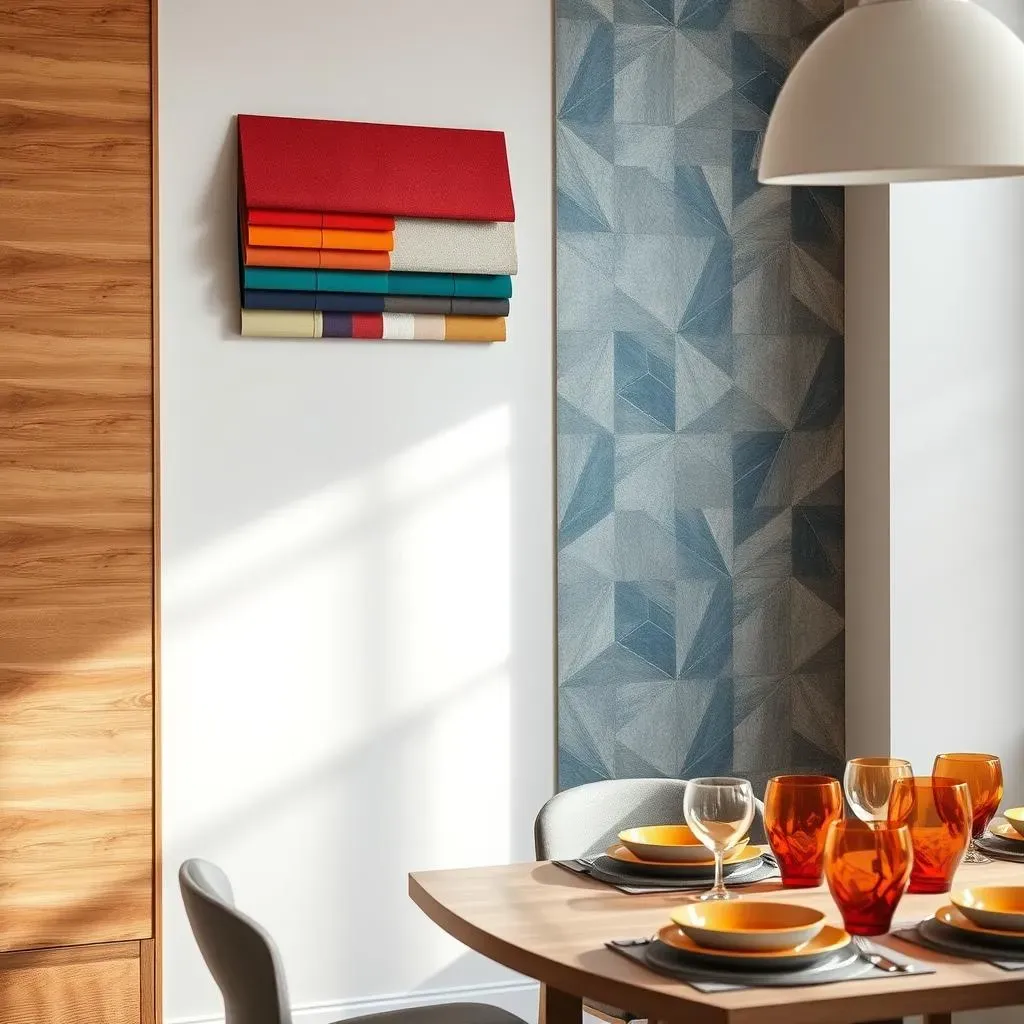
Choosing the Right Materials and Colors for Your Dining Room Accent Wall
Material Considerations
so you've got some dining room accent wall ideas swirling around in your head – fantastic! But before you run to the store, let's talk materials. The material you choose will drastically impact the look and feel of your accent wall, as well as its durability and maintenance. Wood, for example, brings warmth and texture, but it can be susceptible to moisture damage. Tile is incredibly durable and easy to clean, but it can feel a bit cold and sterile if not balanced with softer elements. Wallpaper offers endless design possibilities, but it can be tricky to install and remove. Consider your lifestyle, your budget, and the overall aesthetic you're aiming for when making your decision.
Think about the existing elements in your dining room. Do you have hardwood floors? A rustic wood accent wall could be a perfect complement. Is your dining room modern and minimalist? Sleek tile or a geometric wallpaper might be a better fit. And don't forget about practical considerations! If you have kids or pets, you'll want to choose a material that's easy to clean and resistant to scratches and stains.
Color Psychology and Dining Rooms
Now, let's dive into the fun part: color! Color has a powerful impact on our emotions and appetites, so it's crucial to choose the right hues for your dining room accent wall. Warm colors like red, orange, and yellow can stimulate appetite and create a cozy, inviting atmosphere. Cool colors like blue, green, and purple can promote relaxation and create a more formal, sophisticated setting. Neutral colors like gray, beige, and white offer versatility and can be paired with pops of color to create a balanced look.
Consider the size and lighting of your dining room when choosing the right colors for your dining room accent wall. Dark colors can make a small room feel even smaller, while light colors can brighten up a dark space. If your dining room gets a lot of natural light, you can experiment with bolder colors. If it's dimly lit, stick to lighter shades that will reflect light and create a more airy feel.
- Warm colors stimulate appetite.
- Cool colors promote relaxation.
- Neutral colors offer versatility.
Coordinating with Existing Décor
The key to a successful accent wall is coordination. You don't want your accent wall to clash with the rest of your dining room décor! Consider the colors of your furniture, your flooring, and your existing wall décor. Choose a color for your accent wall that complements these elements and creates a cohesive look. You can use a color wheel to find complementary colors or simply browse online for inspiration.
If you're feeling overwhelmed, start with a neutral color palette and add pops of color through your accessories. A gray accent wall, for example, can be paired with colorful artwork, vibrant tableware, and patterned curtains. Or, if you're feeling bold, choose a statement color for your accent wall and tone down the rest of the décor. The possibilities are endless, so have fun and experiment until you find a look that you love!
Décor Style | Accent Wall Color Suggestions |
|---|---|
Modern | Gray, White, Navy Blue |
Farmhouse | Sage Green, Cream, Light Gray |
Bohemian | Terracotta, Mustard Yellow, Teal |
Traditional | Burgundy, Forest Green, Gold |
Frequently Asked Questions About Dining Room Accent Walls
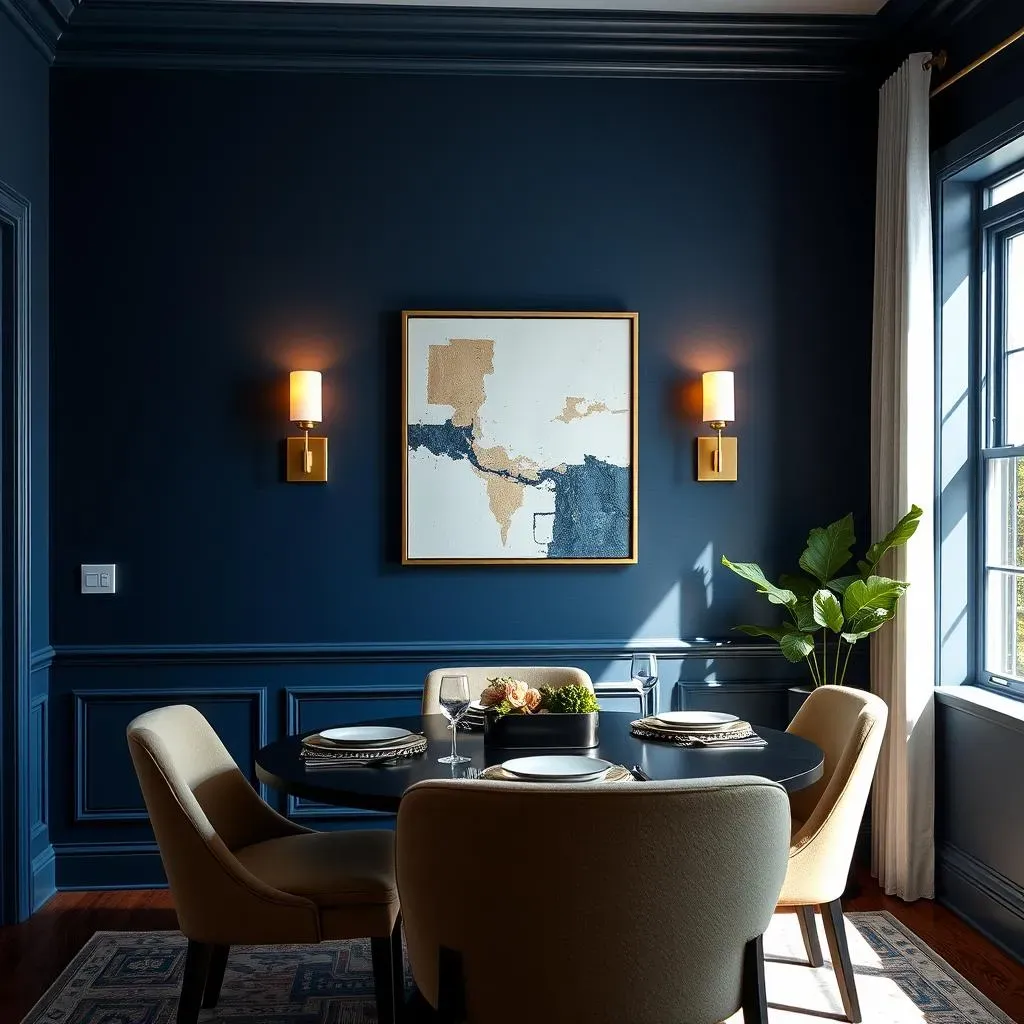
Frequently Asked Questions About Dining Room Accent Walls
What's the best color for a dining room accent wall?
Ah, the million-dollar question! Honestly, there's no single "best" color. It really depends on your personal style, the size of your dining room, and the existing décor. However, if you're looking for some guidance, warm colors like terracotta, mustard yellow, or even a deep burgundy can create a cozy and inviting atmosphere, perfect for those long, leisurely dinners. If you prefer a more formal or sophisticated vibe, try cool colors like navy blue, emerald green, or a sophisticated gray. Just remember to consider the amount of natural light your dining room gets – darker colors can make a small, dimly lit room feel even smaller.
Don't be afraid to experiment! Grab some paint samples and test them out on your wall before committing to a full gallon. Observe how the colors look at different times of the day and under different lighting conditions. And most importantly, choose a color that you love and that makes you feel good in your dining room!
Can I use wallpaper on an accent wall?
Absolutely! In fact, wallpaper is a fantastic way to add personality and visual interest to your dining room accent wall. Forget those outdated floral patterns – modern wallpaper comes in a huge variety of styles, from geometric prints and textured designs to bold graphics and even realistic murals. Wallpaper is a perfect way to create a focal point and add a touch of luxury to your dining space. Just be sure to choose a wallpaper that complements your existing décor and that's appropriate for a dining room environment – meaning it should be durable and easy to clean.
Consider using a peel-and-stick wallpaper for an easy and commitment-free option. These wallpapers are super easy to install and remove, making them perfect for renters or anyone who likes to change up their décor frequently. Or, if you're feeling more adventurous, go for a traditional wallpaper and hire a professional installer for a flawless finish.
How do I incorporate lighting into my accent wall design?
Lighting is key to showcasing your dining room accent wall and creating the right ambiance. Consider adding sconces to either side of your accent wall to highlight its texture and color. Or, install recessed lighting above the wall to create a dramatic spotlight effect. If you have artwork on your accent wall, use picture lights to illuminate the pieces and draw attention to them.
Also, think about the type of lighting you're using. Warm lighting (with a yellowish hue) can create a cozy and inviting atmosphere, while cool lighting (with a bluish hue) can create a more modern and sophisticated look. Experiment with different types of lighting until you find the perfect balance for your dining room.
Lighting Type | Effect |
|---|---|
Sconces | Highlights texture and color |
Recessed Lighting | Creates a spotlight effect |
Picture Lights | Illuminates artwork |
Final Thoughts: Your Dining Room, Your Statement
So, you've journeyed through a gallery of dining room accent wall ideas, from the elegantly subtle to the audaciously bold. Remember, the best accent wall is one that resonates with your personal style and complements the overall aesthetic of your home. Don't be afraid to experiment with colors, textures, and materials to create a space that truly reflects your personality. Whether you choose to tackle a DIY project or enlist the help of professionals, the impact of a well-designed accent wall is undeniable. It's an opportunity to inject character, create a focal point, and transform your dining room into a space you'll love for years to come. Now go forth and create a dining experience that's as visually stunning as it is delicious!
